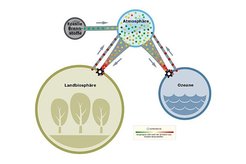Mitigating climate change through alternative control strategies

Scientists are exploring many different options to reduce further atmospheric accumulation of greenhouse gases and dangerous climate change. The diversity of options ranges from planting trees for absorbing more CO2 to injection of aerosols in the atmosphere for reducing incoming solar radiation. The ultimate goal is to manage the entire carbon cycle and the energy balance on planet Earth, an extremely ambitious task with unknown consequences and without a guarantee for success.
However, humans are very successful at steering complex systems by using advanced concepts of mathematical control theory. Impressive examples are autonomous transportation vehicles, robotic systems in assembly lines, and congestion regulation in transport and communication networks. Despite their large potential, very few attempts have been made to introduce such concepts to climate science and policy.
Researchers from the Max Planck Institute for Biogeochemistry in Jena, Germany, and the University of Washington, USA, have now made an important advance in integrating concepts from control theory in Earth system modeling. “Climate models are highly complex, and programmed in a way in which it is very difficult to perform abstract mathematical analyses. In our study we developed a mathematical framework to manipulate climate and carbon cycle models so that we can apply formal control concepts”, says Dr. Carlos Sierra, group leader at Max Planck Institute for Biogeochemistry and lead author of the study.
Using such concepts, the authors show that the current approach to climate science and policy relies on long-term scenarios of fossil fuel emissions and mitigation. In control theory, this is analogous to open-loop control, in which a system receives instructions of what to perform in order to reach a specific goal without checking whether it has been achieved. In contrast, the more powerful closed-loop control uses continuous observations to check whether prescribed actions work, and tries to continuously correct deviations from (pre)defined goals. ‘It is a little like the difference between your washing machine and your refrigerator’, explains Sierra. ‘Your washing machine uses a set of instructions about what to do in which time frame, without checking whether the clothes are already clean or dry enough. This is open-loop control. In contrast, your refrigerator constantly monitors the internal temperature and cools or pauses accordingly, in a closed-loop form’.
By analogy, the authors show that levels of carbon dioxide in the atmosphere can be controlled using the same mathematical tools used to prevent congestion in communication networks or in traffic. The ocean and the terrestrial biosphere are important sinks of carbon dioxide. They naturally absorb this gas from the atmosphere and store it for long time periods, however with only a limited capacity. As a consequence, when we release more and more carbon from fossil sources, carbon dioxide accumulates in the atmosphere as in a traffic jam. Congestion problems are complex, but control theory provides very effective methods to solve them. Sierra and colleagues exemplify in their study how to mathematically maintain constant levels of carbon dioxide. “In our model, we apply a control mechanism that only allows carbon emissions based on the natural capacity of the oceans and the terrestrial biosphere to absorb carbon”, Sierra explains.
The study by Sierra and colleagues could be the beginning of new concepts and approaches for managing the Earth’s energy balance with tools from control theory. These approaches will rely less on future scenarios, but, e.g., on calculations of emission allowances based on current natural conditions, as well as continuous monitoring and rapid adaptation of goals.
Publication
Closed-loop and congestion control of the global carbon-climate system.
Sierra, C.A., Metzler, H., Müller, M. et al. Climatic Change 165, 15 (2021). doi 10.1007/s10584-021-03040-0
Contact
Carlos A. Sierra
Max Planck Institute for Biogeochemistry
Hans-Knöll-Str. 10, 07745 Jena, Germany
Tel: +49 3641 576133
csierra@bgc-jena.mpg.de
